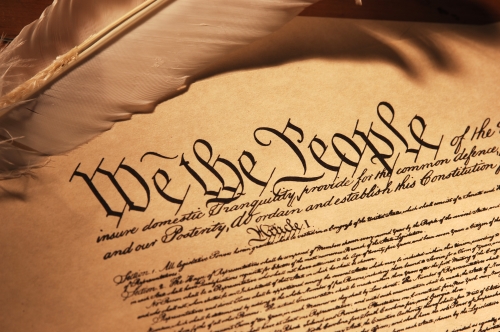“Patent owners might find it disconcerting to note that, while the Personal Audio and Duke University cert denials leave pro-petitioner/alleged infringer decisions below undisturbed, the Court’s request for a response in RPM International indicates its interest in a decision that could spell a big win for PTAB petitioners troubled by the outcome of Arthrex.”
 Last week, an order list issued by the U.S. Supreme Court indicated that the nation’s highest court had granted a pair of petitions for writ of certiorari which were then consolidated into Davis v. Saul. The petition in Davis asks the Supreme Court to determine whether claimants seeking disability benefits or supplemental security income under the Social Security Act (SSA) must exhaust their Appointments Clause challenges with the administrative law judge (ALJ) at the agency in order to obtain judicial review of that challenge in federal court. Given the Appointments Clause challenge to the Patent Trial and Appeal Board (PTAB) proceedings at issue in Arthrex v. Smith & Nephew, many patent practitioners are interested in the Supreme Court’s ultimate decision on whether such challenges can be brought up for the first time on appeal from agency proceedings when parties first claim that constitutional challenge while seeking judicial review in federal courts.
Last week, an order list issued by the U.S. Supreme Court indicated that the nation’s highest court had granted a pair of petitions for writ of certiorari which were then consolidated into Davis v. Saul. The petition in Davis asks the Supreme Court to determine whether claimants seeking disability benefits or supplemental security income under the Social Security Act (SSA) must exhaust their Appointments Clause challenges with the administrative law judge (ALJ) at the agency in order to obtain judicial review of that challenge in federal court. Given the Appointments Clause challenge to the Patent Trial and Appeal Board (PTAB) proceedings at issue in Arthrex v. Smith & Nephew, many patent practitioners are interested in the Supreme Court’s ultimate decision on whether such challenges can be brought up for the first time on appeal from agency proceedings when parties first claim that constitutional challenge while seeking judicial review in federal courts.
Davis Focus on ‘Inquisitorial’ Nature of SSA Proceedings Could Limit Application at Adversarial PTAB
When Arthrex was decided at the Federal Circuit last Halloween, the appellate court held that the appointment mechanism for administrative patent judges (APJs) at the PTAB by the Secretary of Commerce violated the Appointments Clause because APJs were principal officers under the U.S. Constitution. The Federal Circuit’s decision severed the application of removal provisions in Title 5 of U.S. Code as they had previously applied to APJs to remedy the Appointments Clause issue, rendering APJs as inferior officers which could now be removed without cause. On October 13 of this year, the Supreme Court granted certiorari on the petition in Arthrex to resolve two issues: whether APJs are principal officers that must be appointed by the President with the Senate’s advice and consent, or inferior officers whose appointments are permissibly vested in a department head; and whether severing the APJ tenure provisions under Title 5 to allow for APJ removal without cause properly cured the Appointments Clause defect.
A reading of the petition in Davis would seem to indicate that the Supreme Court’s ultimate decision in that case will likely have a limited impact on Appointments Clause challenges to APJs under Arthrex. For one, the question asked by Davis, whether Appointments Clause challenges have to be exhausted first at the agency level, has already been answered in Arthrex, where the constitutional challenge was upheld without being raised at the PTAB under the Supreme Court’s precedent in Freytag v. Commissioner (1991). Secondly, the petition in Davis focuses on the inquisitorial nature of the agency proceeding at issue there, arguing that an issue-exhaustion requirement eliminating the petitioner’s right to judicial review of the constitutional challenge “‘would impose an unprecedented burden on SSA claimants’—many of whom lack legal representation—by forcing them to ‘root out a constitutional claim’ in an ‘informal, non-adversarial’ process in which the ALJ ordinarily ‘plays [the] starring role’ in identifying and developing the issues,’” citing to language from the Third Circuit’s decision earlier this year in Cirko v. Commissioner. By contrast, the PTAB’s inter partes review (IPR) proceedings for challenging patent validity at issue in Arthrex are much more adversarial in appearance: unlike SSA proceedings initiated to obtain government benefits, IPRs often involve parties that oppose each other in district court patent infringement litigation and IPRs are petitioned by private parties to challenge patent rights owned by other private parties and not to obtain government benefits through entitlement status.
Does the Remedy in Arthrex Magnify Other Due Process Concerns at the PTAB?
Other differences between the SSA proceedings in Davis and the PTAB proceedings in Arthrex highlight further reasons why the Appointments Clause issue and the remedy proffered by Arthrex are so important to the patent community. It’s no question that the PTAB, long considered a “patent death squad” by some observers of the U.S. patent system, has given rise to a unique set of constitutional due process concerns, many of which crystallized this past summer during briefing of a PTAB appeal brought to the Federal Circuit by New Vision Gaming. In a corrected appellant brief, New Vision Gaming argues several constitutional flaws to PTAB proceedings, especially IPRs and other patent validity challenge trials enacted under the America Invents Act (AIA), including salary bonuses for APJs based on subjective evaluation criteria, a no dissent policy at the PTAB which discourages APJs from parting with majority decisions, and a general lack of judicial independence for APJs which “has created a structural bias unlike any other in the federal executive branch” according to New Vision Gaming’s brief.
If the remedy in Arthrex to convert APJs into inferior officers under the Constitution was to sever the removal provisions in Title 5, allowing for the removal of APJs from the PTAB without cause, then arguably this remedy only magnifies the due process concerns raised by those such as New Vision Gaming, as APJs now have fewer job protections and are even more beholden to the policy whims of agency supervisors. These concerns aren’t as present in Davis since SSA adjudications are undertaken by ALJs who, under law, cannot receive bonuses or have their employment affected by performance evaluations conducted by supervisors. By contrast, the APJs at the PTAB are non-ALJ administrative judges and are not covered by many of the provisions which protect ALJs.
In defining the contours of Arthrex’s application to other PTAB appeals, the Federal Circuit has tended to draw a bright-line rule on the timing of such appeals, concluding that remand based on the Appointments Clause is not appropriate for appeals filed on PTAB final decisions issued any time after Arthrex, a decision that immediately cured the Appointments Clause issue in the Federal Circuit’s eyes. Further, the Supreme Court seems unlikely to consider the Appointments Clause issue in the patent context beyond Arthrex. On the same day that the Court granted cert to Davis, it denied cert to Personal Audio v. CBS Corporation and Duke University v. BioMarin Pharmaceuticals, both of which asked the Supreme Court to rule on novel Appointments Clause challenges to PTAB APJs. Personal Audio asked whether an IPR that violated the Appointments Clause should be given collateral estoppel effect over a prior jury verdict, and Duke University asked a question very similar to Davis: whether a court of appeals can invoke forfeiture to refuse to address an Appointments Clause violation in a pending appeal despite an intervening change in law. Duke University also asked whether the USPTO’s delegation of authority to institute IPRs to APJs acting as principal officers outside the Director’s review violates 35 U.S.C. § 314, which vests institution authority solely in the Director.
Other PTAB Appointments Clause Petitions Currently at the Supreme Court
There are two other Appointments Clause petitions currently before the Supreme Court of which PTAB practitioners may want to make note. On November 6, Customedia Technologies filed a petition for rehearing of the Supreme Court’s order previously denying its petition for writ of certiorari in mid-October. Like Duke University, one of the questions asked by Customedia focuses on whether appellate courts can claim that Appointments Clause challenges have been forfeited despite intervening changes to law. On the same day that the Supreme Court denied Customedia’s petition, it granted cert to Arthrex and Customedia argues that grant of cert “is therefore an intervening circumstance of a substantial or controlling effect here where Customedia appealed a final written decision of the PTAB to the Federal Circuit and raised an Appointments Clause challenge through appropriate methods.”
A second petition was filed in early September by RPM International, a petitioner that successfully challenged patent validity through an IPR proceeding at the PTAB which was then reversed by the Federal Circuit under Arthrex. In its petition, RPM International argues that Arthrex was wrongly decided, that patent owner Alan Stuart forfeited his Appointments Clause challenge by failing to raise it at the PTAB, and that APJs are inferior officers because they receive direction and supervision from the USPTO Director. On November 9, the same day that the Supreme Court took up Davis while denying Personal Audio and Duke University, the Court requested that respondent Stuart enter a response in the case. Patent owners might find it disconcerting to note that, while the Personal Audio and Duke University cert denials leave pro-petitioner/alleged infringer decisions below undisturbed, the Court’s request for a response in RPM International indicates its interest in a decision that could spell a big win for PTAB petitioners troubled by the outcome of Arthrex.
While time will have to tell how the Supreme Court decides in Arthrex, with oral arguments well off into the future, it’s clear that not only has the Court taken an interest in Appointments Clause challenges to administrative agencies, but that this interest comes at a time when many other constitutional issues at the PTAB are very deserving of the same attention.
IPWatchdog reached out to experts for additional insight into the potential relevance of Davis to Arthrex:
 Lee J. Strang, John W. Stoepler Professor of Law & Values, University of Toledo College of Law
Lee J. Strang, John W. Stoepler Professor of Law & Values, University of Toledo College of Law
“There are two separate issues in Arthrex and Davis. In Arthrex, the substantive question is whether APJs are principal or inferior officers. In Davis, the petitioners are still on the question of whether or not federal courts should hear the underlying Appointments Clause challenge. This is the time of a lot of ferment on Appointments Clause issues. This area has become less stable over the last 20 years because we have a large cadre of Justices, probably a majority now, who feel that longstanding facets of the administrative state are not consistent with the Constitution’s original meaning. ALJs are everywhere and the way those positions were staffed during the New Deal when many agencies were created, they were not appointed by the commissioners themselves, they were typically appointed by lower-level deputies who themselves were not principal officers. Freytag v. Commissioner was decided in 1991 and it dealt with special tax judges but there was discussion at that time that the case was worrisome because special tax judges are a lot like ALJs. Then Lucia v. SEC comes along and confirms this. For Davis, the average attorney going through an administrative agency proceeding is working with attorneys whose fingers are not on the pulse of the Appointments Clause case law. It’s only after Lucia that the issue comes onto an attorney’s radar, and in Davis that happens only after the applicants are in federal court.
The reason the issue in Davis arises is that there’s an exhaustion requirement by which such challenges have to be raised at the agency before review in federal court. The idea behind administrative agencies is that they have expertise and experience, that the Social Security Administration has ALJs working on Social Security cases all day, every day, whereas federal judges are generalists. Let’s have the ALJs at the SSA answer the constitutional question because maybe they’ll actually agree with the petitioner and say, “You’re right, I’m not properly appointed.” The big elephant in the room is that, while some agencies like the Securities and Exchange Commision in Lucia do some administrative adjudication but not a whole lot, the Social Security Administration hears hundreds of thousands of cases each year. One of the things the appellate court was worried about in this case is, if Davis gets a second bite at the Appointments Clause apple, how many other people get to do the same thing and is that practical reality too harmful for the court to say yes, let’s rehear this.
Normally, the Supreme Court has said that federal courts won’t review challenges to agency actions that are constitutional if not presented during the agency proceeding. Parties have to exhaust their claims, including their constitutional ones, before the agency, but there are two “buts” here. First, the major Appointments Clause cases all involve non-fully exhausted claims that weren’t raised at every stage of the proceeding before the issue was raised in federal court. When courts took Appointments Clause arguments, they did so because of the importance of separation of powers. It’s something brewing in the case law. The language of Chief Justice Roberts’ majority opinion in Free Enterprise Fund v. PCAOB about why it’s so important for elected executive branch officials to have control over administrative agencies was a powerful statement explaining why the Supreme Court would take an Appointments Clause issue not raised with the agency. Second, the issue in Davis is similar to cases in criminal procedure in which people are tried and convicted based on one Supreme Court interpretation of the Constitution, and then the Court has a new case like a Miranda in which it announces what seem like new constitutional rights. Do people sitting in jail get the chance to have their case reheard under a new constitutional right where they just might win? In Teague v. Lane, the Supreme Court split the baby and said that while there are certain kinds of newly identified constitutional rights where a convicted defendant can have a second bite at the apple, the vast majority of defendants will not get their second bite. I think that’s the same thing going on in Davis. The Supreme Court is rightly saying that parties have to raise their issues to the agency, but for very important issues like the Appointments Clause, courts can hear those issues even if they’re not raised earlier.”
 Daniel Hanson, Senior In-House Patent Counsel for Huawei Canada
Daniel Hanson, Senior In-House Patent Counsel for Huawei Canada
The views expressed here are his own.
“I’m not sure that the Davis case would have much effect on Arthrex since the Supreme Court expressly refused to consider the preservation of constitutional error issue in Arthrex. Preservation of error might come up anyway during briefing and oral argument, but it seems to be tacitly accepted that there was nothing the agency in Arthrex could do to deal with the Appointments Clause challenge. There is nothing wrong with challenging a tribunal on constitutional grounds. But such a challenge should include a request for relief that is within the agency’s power to grant, and such did not seem to be present in Arthrex. Besides, the Federal Circuit ruled that it was exercising its discretion to hear the constitutional issues. Reversing any court for abuse of discretion is really hard, so maybe that’s why the Supreme Court didn’t think the constitutional preservation issue was worth its time.
The Davis case seems to focus upon exhaustion of administrative remedies rather than preservation of error. The concepts are related but distinct. Exhaustion applies to review of administrative agency action by a court, while preservation applies to appellate procedure, even where no administrative agency is involved. Court review of agency action is appellate in nature; so the court usually demands that the issues be presented and developed in the lower tribunal, and not be urged for the first time on appeal. Indeed, in the case of In re Google Tech. Holdings LLC, decided last Friday, the Federal Circuit stressed that it is an appellate court that reviews decisions, rather than a court that hears issues for the first time.”

![[IPWatchdog Logo]](https://ipwatchdog.com/wp-content/themes/IPWatchdog%20-%202023/assets/images/temp/logo-small@2x.png)

![[[Advertisement]]](https://ipwatchdog.com/wp-content/uploads/2023/01/2021-Patent-Practice-on-Demand-1.png)
![[Advertisement]](https://ipwatchdog.com/wp-content/uploads/2024/04/UnitedLex-May-2-2024-sidebar-700x500-1.jpg)
![[Advertisement]](https://ipwatchdog.com/wp-content/uploads/2024/04/Artificial-Intelligence-2024-REPLAY-sidebar-700x500-corrected.jpg)
![[Advertisement]](https://ipwatchdog.com/wp-content/uploads/2024/04/Patent-Litigation-Masters-2024-sidebar-700x500-1.jpg)

![[Advertisement]](https://ipwatchdog.com/wp-content/uploads/2021/12/WEBINAR-336-x-280-px.png)
![[Advertisement]](https://ipwatchdog.com/wp-content/uploads/2021/12/2021-Patent-Practice-on-Demand-recorded-Feb-2021-336-x-280.jpg)
![[Advertisement]](https://ipwatchdog.com/wp-content/uploads/2021/12/Ad-4-The-Invent-Patent-System™.png)






Join the Discussion
2 comments so far.
Paul F Morgan
November 17, 2020 11:01 amThank you for this detailed review of possibly Arthrex related possible Sup. Ct, decisions from other non-patent cases.
Just a reminder of other distinctions: APJS are not ALJs.
They they are now appointed by the Sec. of Commerce, a direct presidential appointee. Nor are all Social Security appeal hearings ex parte. E.g., where two wives are litigating over who [or both] would get social security from their dead husbands account. I was a pro bono counsel in one such disputed case many years ago.
Brin Tvinx
November 17, 2020 10:50 amTime will tell how this will end with patents. But it’s too early to judge the result so it seems to me